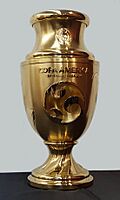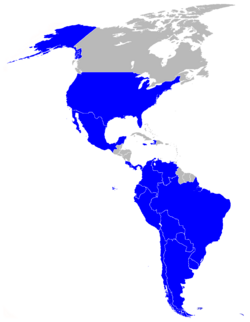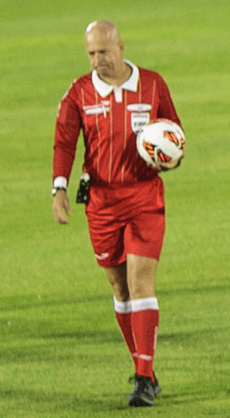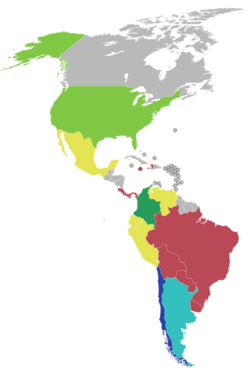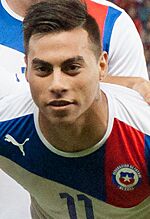Copa América Centenario facts for kids
| Centennial Cup America (English) Copa América Centenário (Portuguese) |
|
|---|---|
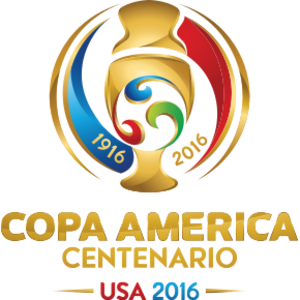 |
|
| Tournament details | |
| Host country | United States |
| Dates | June 3 – 26 |
| Teams | 16 (from 2 confederations) |
| Venue(s) | 10 (in 10 host cities) |
| Final positions | |
| Champions | |
| Runners-up | |
| Third place | |
| Fourth place | |
| Tournament statistics | |
| Matches played | 32 |
| Goals scored | 91 (2.84 per match) |
| Attendance | 1,483,855 (46,370 per match) |
| Top scorer(s) | |
| Best player | |
| Best goalkeeper | |
| Fair play award | |
The Copa América Centenario was a special international soccer tournament for men. It was held in the United States in 2016. This competition celebrated 100 years of CONMEBOL (the South American football group) and the Copa América tournament. It was the first time the Copa América was played outside South America.
This tournament was a special edition, not the regular 45th one. It was planned by CONMEBOL and CONCACAF (the North and Central American football group). The tournament had 16 teams, which was more than the usual 12. All ten teams from CONMEBOL played, plus six teams from CONCACAF. Even though it was an official Copa América, the winner did not get a spot in the 2017 FIFA Confederations Cup. However, Chile, who won this tournament, had already qualified for the Confederations Cup by winning the 2015 Copa América.
Chile became the fourth country to win two CONMEBOL tournaments in a row. The other countries were Uruguay, Argentina, and Brazil. Argentina, on the other hand, lost its third major final in a row. They had lost to Germany in the 2014 World Cup and to Chile in the 2015 Copa América.
Contents
- Planning the Tournament
- The Special Trophy
- Choosing the Host Country
- Stadiums Used
- Teams That Played
- The Draw for Groups
- Team Rosters
- Match Officials
- Opening Ceremony
- Group Stage Matches
- Knockout Stage
- Tournament Statistics
- Awards and Recognition
- Tournament Marketing
- Broadcasting the Games
- More About Soccer
- See also
Planning the Tournament
In February 2012, Alfredo Hawit of CONCACAF said the tournament would likely happen in 2016. It was meant to celebrate CONMEBOL's 100th birthday. Nicolás Leoz, the CONMEBOL President, hoped for a "big event" to celebrate this milestone.
CONMEBOL officially announced the tournament on October 24, 2012. CONCACAF confirmed it on May 1, 2014. On September 26, 2014, FIFA added the tournament to its official calendar. This meant clubs had to let their players join their national teams for the competition. The tournament took place in June 2016, at the same time as UEFA Euro 2016.
Tournament Challenges
There were some doubts about the tournament happening due to issues with sports officials. Some people involved with the media rights for the event faced problems. However, on October 23, 2015, CONCACAF, CONMEBOL, and the U.S. Soccer Federation confirmed the tournament would go ahead as planned.
The Special Trophy
A new trophy was made just for this tournament. It was first shown on April 28, 2016, in Bogotá, Colombia. This "new" trophy was a special commemorative one. The winning country got to keep it forever. The original silver Copa América trophy would still be given to winners of the regular tournaments.
The Centenario trophy looks like the original one but is covered in matte gold. It has the Copa América Centenario logo on the front. On its sides, there are images of North and South America connected. This celebrates the tournament being held outside South America for the first time. The base of the trophy has 16 spots where the names of all 16 participating nations are engraved. It also features the logos of CONMEBOL and CONCACAF. The years "1916–2016" are there to mark 100 years of CONMEBOL and the Copa América. Phrases like "La Copa del Siglo" (The Cup of the Century) and "Uniting the Americas" are also included.
Choosing the Host Country
Luis Chiriboga, the President of the Ecuadorian Football Federation, mentioned that the United States and Mexico might host parts of the competition. Jeffrey Webb, then CONCACAF President, preferred the United States because of its large market and many stadiums.
On May 1, 2014, it was announced that the United States would host the tournament. It would run from June 3 to June 26, 2016. Some people, like Uruguay Football Association president Wilmar Valdez, criticized the choice of the U.S. He felt that the U.S. was "a country where they don't feel football."
Stadiums Used
On January 8, 2015, CONCACAF and CONMEBOL announced that 24 U.S. cities were interested in hosting games. Stadiums needed to have a capacity of at least 50,000 people. The final list of 10 venues was announced on November 19, 2015.
| Pasadena, California (Los Angeles Area) |
East Rutherford, New Jersey (New York City Area) |
Houston, Texas | Philadelphia, Pennsylvania |
|---|---|---|---|
| Rose Bowl | MetLife Stadium | NRG Stadium | Lincoln Financial Field |
| Capacity: 92,542 | Capacity: 82,566 | Capacity: 71,000 | Capacity: 69,176 |
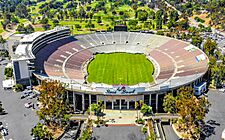 |
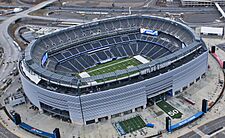 |
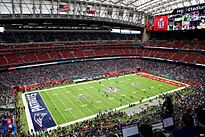 |
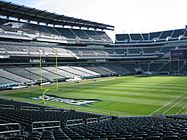 |
| Foxborough, Massachusetts (Boston Area) |
Santa Clara, California (San Francisco Bay Area) |
||
| Gillette Stadium | Levi's Stadium | ||
| Capacity: 68,756 | Capacity: 68,500 | ||
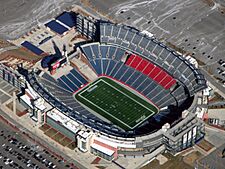 |
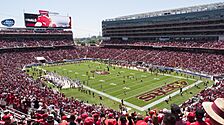 |
||
| Seattle, Washington | Chicago, Illinois | Glendale, Arizona (Phoenix Area) |
Orlando, Florida |
| CenturyLink Field | Soldier Field | University of Phoenix Stadium | Camping World Stadium |
| Capacity: 67,000 | Capacity: 63,500 | Capacity: 63,400 | Capacity: 60,219 |
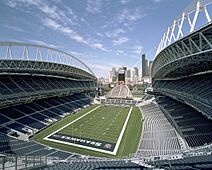 |
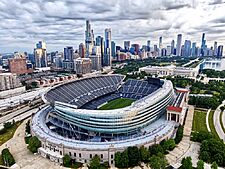 |
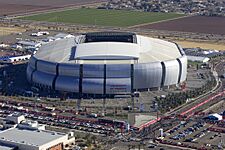 |
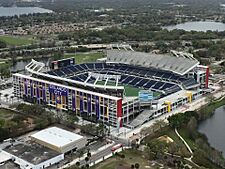 |
Teams That Played
All ten CONMEBOL countries played in the tournament. Six teams from CONCACAF also joined. The United States (as host) and Mexico automatically qualified. The other four CONCACAF spots went to:
- Costa Rica (won the 2014 Copa Centroamericana)
- Jamaica (won the 2014 Caribbean Cup)
- Haiti and Panama (won special playoff games)
| CONMEBOL (10 teams) | CONCACAF (6 teams) |
|---|---|
The Draw for Groups
The teams were put into groups in a special draw on February 21, 2016, in New York City. The United States was placed in Group A as the host. Argentina was in Group D because it was the highest-ranked CONMEBOL team by FIFA in December 2015. Brazil (Group B) and Mexico (Group C) were also chosen as top teams. Some people thought other strong teams like Uruguay or Chile should have been top seeds too.
Teams were divided into four pots based on their FIFA rankings.
| Pot 1 | Pot 2 | Pot 3 | Pot 4 |
|---|---|---|---|
Team Rosters
Each country had a team of 23 players. Three of these players had to be goalkeepers. The teams had to submit their final lists of players by May 20, 2016.
Match Officials
Referees and their assistants from different countries were chosen to officiate the matches.
Opening Ceremony
The tournament's opening ceremony happened at Levi's Stadium in Santa Clara on June 3, 2016. It took place just before the first match. The ceremony featured musical performances by singers J Balvin and Jason Derulo, and the band Magic!.
Group Stage Matches
All game times were in Eastern Daylight Time (EDT). The top two teams from each group moved on to the next round, called the quarterfinals.
How Teams Were Ranked
Teams in each group were ranked based on:
- Most points from all group matches.
- Goal difference (goals scored minus goals against).
- Most goals scored.
- If teams were still tied, their ranking was decided by:
* Points in matches between the tied teams. * Goal difference in matches between the tied teams. * Goals scored in matches between the tied teams. * Finally, a drawing of lots if still tied.
Group A
| Pos | Team | Pld | W | D | L | GF | GA | GD | Pts | Qualification |
|---|---|---|---|---|---|---|---|---|---|---|
| 1 | 3 | 2 | 0 | 1 | 5 | 2 | +3 | 6 | Advance to knockout stage | |
| 2 | 3 | 2 | 0 | 1 | 6 | 4 | +2 | 6 | ||
| 3 | 3 | 1 | 1 | 1 | 3 | 6 | −3 | 4 | ||
| 4 | 3 | 0 | 1 | 2 | 1 | 3 | −2 | 1 |
(H) Host.
Copa América Centenario Group A Copa América Centenario Group A
Copa América Centenario Group A Copa América Centenario Group A
Copa América Centenario Group A Copa América Centenario Group A
Group B
| Pos | Team | Pld | W | D | L | GF | GA | GD | Pts | Qualification |
|---|---|---|---|---|---|---|---|---|---|---|
| 1 | 3 | 2 | 1 | 0 | 4 | 2 | +2 | 7 | Advance to knockout stage | |
| 2 | 3 | 1 | 2 | 0 | 6 | 2 | +4 | 5 | ||
| 3 | 3 | 1 | 1 | 1 | 7 | 2 | +5 | 4 | ||
| 4 | 3 | 0 | 0 | 3 | 1 | 12 | −11 | 0 |
Copa América Centenario Group B Copa América Centenario Group B
Copa América Centenario Group B Copa América Centenario Group B
Copa América Centenario Group B Copa América Centenario Group B
Group C
| Pos | Team | Pld | W | D | L | GF | GA | GD | Pts | Qualification |
|---|---|---|---|---|---|---|---|---|---|---|
| 1 | 3 | 2 | 1 | 0 | 6 | 2 | +4 | 7 | Advance to knockout stage | |
| 2 | 3 | 2 | 1 | 0 | 3 | 1 | +2 | 7 | ||
| 3 | 3 | 1 | 0 | 2 | 4 | 4 | 0 | 3 | ||
| 4 | 3 | 0 | 0 | 3 | 0 | 6 | −6 | 0 |
Copa América Centenario Group C Copa América Centenario Group C
Copa América Centenario Group C Copa América Centenario Group C
Copa América Centenario Group C Copa América Centenario Group C
Group D
| Pos | Team | Pld | W | D | L | GF | GA | GD | Pts | Qualification |
|---|---|---|---|---|---|---|---|---|---|---|
| 1 | 3 | 3 | 0 | 0 | 10 | 1 | +9 | 9 | Advance to knockout stage | |
| 2 | 3 | 2 | 0 | 1 | 7 | 5 | +2 | 6 | ||
| 3 | 3 | 1 | 0 | 2 | 4 | 10 | −6 | 3 | ||
| 4 | 3 | 0 | 0 | 3 | 2 | 7 | −5 | 0 |
Copa América Centenario Group D Copa América Centenario Group D
Copa América Centenario Group D Copa América Centenario Group D
Copa América Centenario Group D Copa América Centenario Group D
Knockout Stage
In the knockout stage, if a game was tied after 90 minutes, a penalty shoot-out decided the winner. This applied to the quarterfinals, semifinals, and the third-place match. For the final, if it was tied, extra time would be played first, followed by a penalty shoot-out if needed.
Bracket
Copa América Centenario knockout stage
Quarter-finals
Copa América Centenario knockout stage
Copa América Centenario knockout stage
Copa América Centenario knockout stage
Copa América Centenario knockout stage
Semi-finals
Copa América Centenario knockout stage
Copa América Centenario knockout stage
Third place play-off
Copa América Centenario knockout stage
Final
Copa América Centenario final
Tournament Statistics
Top Goal Scorers
Chile's Eduardo Vargas won the Golden Boot award for scoring six goals. There were 91 goals scored in 32 matches, for an average of 2.84 goals per match.
6 goals
5 goals
4 goals
3 goals
2 goals
 Ezequiel Lavezzi
Ezequiel Lavezzi Erik Lamela
Erik Lamela Renato Augusto
Renato Augusto José Pedro Fuenzalida
José Pedro Fuenzalida Edson Puch
Edson Puch Arturo Vidal
Arturo Vidal Carlos Bacca
Carlos Bacca James Rodríguez
James Rodríguez Enner Valencia
Enner Valencia Blas Pérez
Blas Pérez Salomón Rondón
Salomón Rondón
1 goal
 Sergio Agüero
Sergio Agüero Éver Banega
Éver Banega Víctor Cuesta
Víctor Cuesta Ángel Di María
Ángel Di María Nicolás Otamendi
Nicolás Otamendi Juan Carlos Arce
Juan Carlos Arce Jhasmani Campos
Jhasmani Campos Gabriel Barbosa
Gabriel Barbosa Lucas Lima
Lucas Lima Charles Aránguiz
Charles Aránguiz Frank Fabra
Frank Fabra Marlos Moreno
Marlos Moreno Cristián Zapata
Cristián Zapata Celso Borges
Celso Borges Johan Venegas
Johan Venegas Michael Arroyo
Michael Arroyo Jaime Ayoví
Jaime Ayoví Miller Bolaños
Miller Bolaños Christian Noboa
Christian Noboa Antonio Valencia
Antonio Valencia James Marcelin
James Marcelin Jesús Manuel Corona
Jesús Manuel Corona Javier Hernández
Javier Hernández Héctor Herrera
Héctor Herrera Rafael Márquez
Rafael Márquez Oribe Peralta
Oribe Peralta Abdiel Arroyo
Abdiel Arroyo Miguel Camargo
Miguel Camargo Víctor Ayala
Víctor Ayala Christian Cueva
Christian Cueva Edison Flores
Edison Flores Paolo Guerrero
Paolo Guerrero Raúl Ruidíaz
Raúl Ruidíaz Jermaine Jones
Jermaine Jones Bobby Wood
Bobby Wood Gyasi Zardes
Gyasi Zardes Graham Zusi
Graham Zusi Mathías Corujo
Mathías Corujo Diego Godín
Diego Godín Abel Hernández
Abel Hernández Josef Martínez
Josef Martínez José Manuel Velázquez
José Manuel Velázquez
1 own goal
 Frank Fabra (against Costa Rica)
Frank Fabra (against Costa Rica) Je-Vaughn Watson (against Uruguay)
Je-Vaughn Watson (against Uruguay) Álvaro Pereira (against Mexico)
Álvaro Pereira (against Mexico)
Awards and Recognition
Tournament Winner
| 2016 Copa América Centenario champions |
|---|
 Chile 2nd title |
Individual Player Awards
At the end of the tournament, these special awards were given out:
- Golden Ball Award (Best Player):
 Alexis Sánchez
Alexis Sánchez - Golden Boot Award (Top Scorer):
 Eduardo Vargas (6 goals)
Eduardo Vargas (6 goals) - Golden Glove Award (Best Goalkeeper):
 Claudio Bravo
Claudio Bravo - Fair Play Award (Team with best sportsmanship):
 Argentina
Argentina
Final Match Best Player
Team of the Tournament
A group of experts chose the best 11 players from the tournament:
| Goalkeeper | Defenders | Midfielders | Forwards |
|---|---|---|---|
Tournament Marketing
Sponsors
Many companies helped sponsor the Copa América Centenario:
| Sponsors | ||
|---|---|---|
|
Match Balls
The official match ball for the tournament was the Nike Ordem Ciento. It was mainly white with red designs. For the final match, a special version called the Nike Ordem Campeón was used, which had golden designs instead of red.
Theme Songs
Several songs were part of the tournament's theme:
- "Superstar" by American rapper Pitbull featuring Becky G was the official song. Both artists performed it during the Final.
- "Breaking All the Rules" by English rock musician Peter Frampton, who also performed during the Final.
- "In My City" by Indian Singer Priyanka Chopra, who performed during the Final as well.
Broadcasting the Games
The tournament was shown on TV in many countries around the world.
In the Americas
| Country | Broadcaster | Ref. |
|---|---|---|
| DirecTV Sports | ||
| Televisión Pública Argentina (Argentina matches only), TyC Sports (all matches) | ||
| TV Boliviana (all matches) | ||
| Rede Globo (Brazil matches only), SporTV (all matches) | ||
| Univision Canada (Spanish) | ||
| Canal 13 | ||
| RCN TV, Caracol TV | ||
| Repretel, Teletica | ||
| Cubavision International | ||
| Gama TV | ||
| CONATEL, Tele Haiti | ||
| CVM TV | ||
| Televisa, TV Azteca | ||
| Telemetro, TVMax, RPC-TV | ||
| Paraguay TV, Unicanal | ||
| América Televisión | ||
| Fox Sports (English); Univision (Spanish) | ||
| DirecTV, Equital (Monte Cable, Nuevo Siglo, TCC) | ||
| Meridiano TV |
Around the World
| Country | Broadcaster | Ref. |
|---|---|---|
| Arab World | beIN Sports | |
| beIN Sports, SBS | ||
| CBC Sport | ||
| Western Balkans | Arena Sport | |
| Baltics | Viasat Sport Baltic | |
| SMG, LeSports, PPTV, QQLive | ||
| RTVGE, Asonga TV, Canal+ | ||
| Viasat | ||
| beIN Sports | ||
| Sat.1, Kabel eins | ||
| Skai TV | ||
| now TV, ViuTV | ||
| Sport TV | ||
| Stöð 2 Sport | ||
| Sony ESPN, Sony ESPN HD | ||
| Kompas TV | ||
| IRIB Varzesh | ||
| Setanta Ireland | ||
| Sport 1 | ||
| Sky Italia | ||
| SKY PerfecTV! | ||
| Startimes, Canal+ | ||
| Astro | ||
| Sky Net | ||
| Fox Sports Netherlands, NOS | ||
| Sky Sport | ||
| Startimes, Canal+ | ||
| Viaplay | ||
| TVP | ||
| TVI | ||
| Match TV | ||
| StarHub TV, Singtel TV | ||
| Startimes | ||
| KBS | ||
| Movistar+ | ||
| Sub-Saharan Africa | Startimes, Canal+ | |
| Viasat Sport | ||
| CTV, TTV, CTi TV | ||
| TV Varzish | ||
| True Visions | ||
| A Spor, A Haber | ||
| Premier Sports | ||
| SCTV, VTVCab |
More About Soccer
- Soccer in the United States
- Football at the Pan American Games
See also
 In Spanish: Copa América Centenario para niños
In Spanish: Copa América Centenario para niños
 | Selma Burke |
 | Pauline Powell Burns |
 | Frederick J. Brown |
 | Robert Blackburn |


